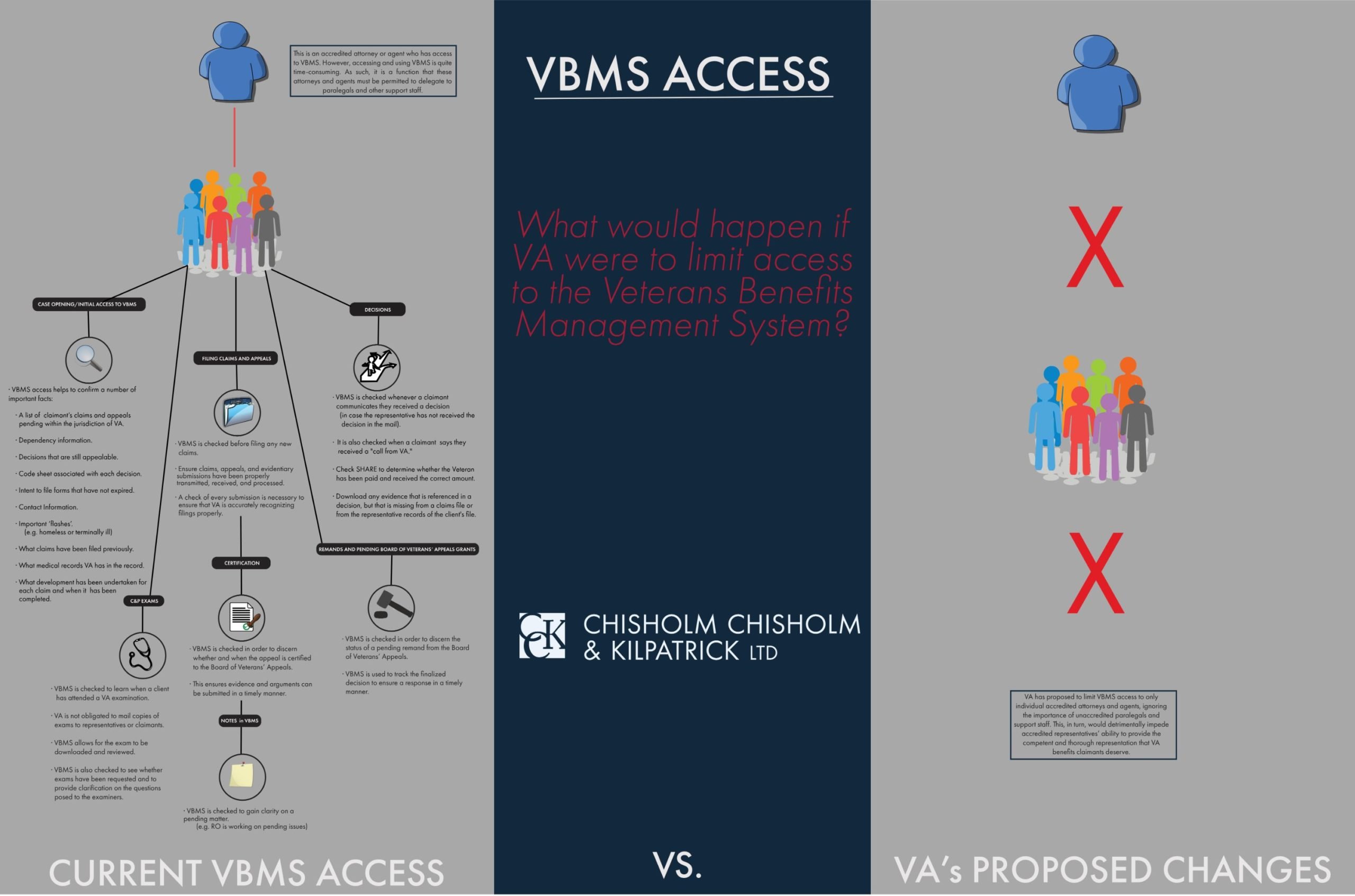VA Proposes Regulations to Limit Attorney Access to the Veterans Benefits Management System (VBMS)

What is the Veterans Benefits Management System (VBMS)?
VA created the Veterans Benefits Management System (“VBMS”) to essentially serve as an electronic database comprised of veterans’ electronic claims files. It is a depository of all the information related to a specific veteran or claimant and their compensation claim.
Who Has Access to VBMS?
Both VA employees, including adjudicators, and accredited attorneys have access to VBMS. When accessing VBMS, adjudicators and advocates must log in and search for a specific veteran within the system. They will then get a list of all of the documents in the veteran’s claims file. In order to go through the claims file, they must click on each individual document to see what it is. Therefore, while VBMS provides better access to this information through an online platform, it is still very time-consuming. Nonetheless, it is very important for veterans’ advocates to have access to VBMS because it is dynamic. This means that a veteran’s file is updated every time a new document, such as a decision, is added. For example, advocates can log into VBMS and find out if a veteran has received a Rating Decision.
What Do Veterans’ Advocates Currently Have Access to in VBMS?
In VBMS, veterans’ advocates have “read only” access to various documents that are essential in the claims and appeals processes. Specifically, veterans’ advocates can see the following:
Important Facts
Upon opening a veteran’s case and obtaining initial access to VBMS, the online database helps advocates confirm a number of important facts:
- A list of claimant’s claims and appeals pending within the jurisdiction of VA
- Dependency information
- Decisions that are still appealable
- Code sheet associated with each decision
- Intent to file forms that have not expired
- Contact information
- Important “flashes” (e.g., homeless or terminally ill)
- What claims have been filed previously
- What medical records VA has in the record
- What development has been undertaken for each claim and when it has been completed
Compensation & Pension (C&P) Examination(s)
VBMS also allows veterans’ advocates to check and see when a client has attended a C&P examination. While VA is not obligated to mail copies of C&P examinations to veterans or their advocates, veterans have the right to request a copy of their examination from their local Regional Office, but this may cause unnecessary delays. VBMS provides a more efficient alternative and allows for the examinations to be downloaded and reviewed.
Filing Claims and Appeals
While VBMS is supposed to contain all of a veteran’s files, VA’s scanning and uploading of claims is not always done in a timely manner and many times documents are mislabeled. VBMS allows advocates to check before filing any new claims on behalf of veterans. It also provides a platform for advocates to ensure that claims, appeals, and evidentiary submissions have been properly transmitted, received, and processed.
Decisions
Often, veterans will communicate with their advocates via telephone or e-mail indicating that they have received a decision from VA. When this happens, advocates check VBMS to determine the decision and plan how to proceed. In some cases, veterans’ advocates do not receive the decision in the mail until days or weeks after the veteran has. Therefore, VBMS allows them to get started on a potential appeal right away. Furthermore, advocates check SHARE to determine whether the veteran has been paid and received the correct amount.
Remands and Pending Board of Veterans’ Appeals Grants
Arguably the most important function of VBMS involves advocates’ ability to check on the status of a pending remand from the Board of Veterans’ Appeals. The remand process, although more typical in the old legacy appeals system, tends to produce the longest waiting period in the appeals process. VBMS is also used to track grants from the Board to ensure they are finalized and implemented by the Regional Office in a timely manner. This is crucial as such decisions often result in retroactive benefits for veterans.
What Are VA’s Proposed Changes?
The Department of Veterans Affairs has proposed to amend its regulations addressing under which circumstances attorneys representing veterans are allowed to access VBMS. Currently, VBMS access is granted to the selected representative and any additional attorneys or accredited agents working for a law firm who is named on VA Form 21-22a (“Appointment of Individual as Claimant’s Representative”). However, the proposed regulation will significantly restrict attorney and accredited agent access to VBMS. Specifically, only the individual representative who signs the form will have full access to the system. All other attorneys or accredited agents listed on the VA Form 21-22a will have to request physical copies of claims files, status updates, and decisions from VA directly.
How Would This Affect Veterans?
Again, VBMS access is important for veterans’ advocates because they need to be aware of what is happening in veterans’ cases in order to provide the most effective representation to the veteran. At the Regional Office and Board levels, the evidence of record is active and continuously changing. VBMS is the only way advocates can see what is going on in the case in real-time. This levels the playing field between advocates and VA adjudicators. Previously, VA was able to operate in isolation and advocates were only able to find out what was happening after the fact. Now, advocates can see the same things the adjudicators can see. Additionally, it improves the level of communication between veterans and their advocates as advocates are currently able to provide real-time updates as to the status of veterans’ claims.
The proposal to limit access to only accredited, designated attorneys and agents ignores the importance of supervised but unaccredited paralegals and support staff in the VA benefits claims process. It fails to appreciate the reality that claimants are not only represented by individual attorneys or agents, but also by law firms, such that limiting access to a designated individual representative of record leaves no room for an entity (such as a law firm) to be appointed as a claimant’s representative. Within a law firm, those non-attorneys are not independent agents but are part of a team headed by, and whose work is supervised by, a licensed attorney. That team works together to advance the client’s interests.
Put simply, VA’s proposed plan to limit access only to accredited, designated attorneys and agents would detrimentally impede accredited representatives’ abilities to provide the competent and thorough representation that VA benefits claimants deserve. It would also curtail the ability of claimants to hire law firms in general, since VA’s proposals only contemplate a single accredited individual as having the ability to represent a claimant and to access that claimant’s electronic records.
About the Author
Share this Post

